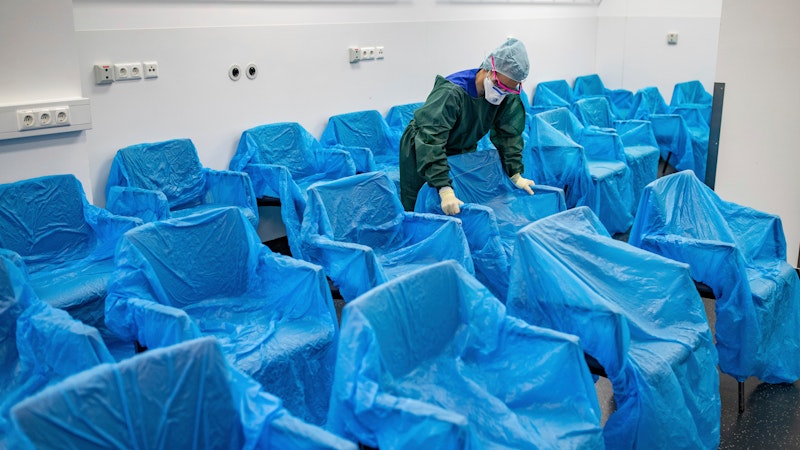Being in the hospital is always horrible. But with COVID, it’s even worse. I ended up in the hospital last week when what I thought was a minor injury to my left leg turned out to be a major blood clot. In addition to the pain and unable to walk, I was quickly subjected to the usual indignities of hospital existence: mediocre to repulsive food; monitors hooked up to various appendages; nurses waking me up every couple of hours; a roommate who’ve bellow every so often to wake me up if the nurses didn’t; injections; more injections; lots and lots of waiting.
This time, though, there was an extra edge of despair and humiliation. Chicago hospitals aren’t overwhelmed by COVID cases yet (though January may be dire.) But as a safety measure, there are no visiting hours; you can’t see family or friends the entire time you’re a patient.
When someone dies in the hospital now, it’s brutal; loved ones never get a chance to say goodbye. If you survive, it’s less apocalyptic, but still emotionally draining—texting isn’t the same as getting to hug your daughter. Beyond that, the no-visiting rules create a situation where patients have no one to advocate for them if the care is less than ideal, or if the staff slips up.
I’m not my mother, who’s a pit bull, but I’m not shy either, and generally manage to advocate for myself adequately. When you’re in pain, can’t walk, and are barely conscious from lack of food or sleep, though, it’s hard to keep after people, even if there’s something that you really need like, say, asthma medication. The hospital had a Byzantine system for getting patient’s inhalers—it went through the respiratory department rather than coming in with other meds. I remembered I needed an inhaler and asked for it on the first night—but then I forgot about it, because of the pain and not sleeping. The hospital forgot too, so when I woke up the next morning after about two hours of sleep, total, I realized I couldn’t really breathe. I finally got them to give me the medication and there were no long-term consequences, which is good. But hospitals aren’t supposed to provoke asthma attacks for no reason.
If my wife had been there, this wouldn’t have happened. She would’ve kept on the staff to get me the damn inhaler. Or, better, she could’ve just brought my own inhaler to me.
Hospitals hate that; they want to control everything you put into yourself and everything that goes out. They’re afraid of lawsuits. And they’re also used to treating patients as infants to be managed, cajoled, and condescended to. When I mentioned that my leg was still painful and that I needed a pillow to prop it up, one nurse told me cheerfully that I was lucky I hadn’t lost the leg. (At no time was I ever in danger of losing my leg.) Another nurse told me that I should be able to get into a chair for breakfast, like it was a rare treat. When I told her that it probably wasn’t worth it since I was hooked up to multiple machines and my leg still hurt a lot, she admitted that it was a hospital rule that I had to get into the chair for breakfast, not a fun optional activity.
I had plenty of nurses who treated me with respect and didn’t belittle me or coddle me like I was six years old. But the point is that the hospital isn’t set up for much patient input into care—which is bad, since as a patient, you’re generally in the best position to comment on the kind of care you need. I’m sure the hospital would’ve figured out that I couldn’t breathe eventually, but as the person most directly affected, I picked up on it early.
It’s important to see friends and family for emotional reasons. But it’s also important as a check on the way that hospitals often disregard patient input and expertise. In the midst of all the tests, rules and procedures, the patient as a person with information about their own needs and comfort and health gets lost. Friends and family can provide a safety valve—they can stand up and find a nurse and maybe go to a vending machine and get you a candy bar or crackers, rather than forgetting about you after you’ve been fasting all day for a procedure that ended three hours ago.
COVID clearly outweighs these considerations; you can’t let loved ones in the hospital in the middle of an out-of-control plague. Still, my recent stay reminded me how important a support structure is, even when you’re in a place that supposedly is taking care of all your needs—or, rather, especially when you’re in such a place. I’m appreciating now that I can get asthma medicine and food for myself. And no one tells me I’m lucky not to have lost my fucking leg.

